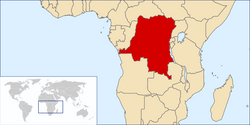Zaire
From Roach Busters
| République du Zaïre Republic of Zaire | |
| | |
 | 
|
| Flag | Coat of arms |
| | |
| Motto "Paix, justice, travail" (French) "Peace, justice, work" | |
| | |
| Anthem La Zaïroise | |
| | |

| |
| | |
| Capital (and largest city) | Kinshasa 4°24′ S 15°24′ E |
| | |
| Official language(s) | French (Lingala, Kikongo, Swahili, and Tshiluba are working languages) |
| | |
| Government - President - First State Commissioner | Republic Mobutu Sese Seko to be decided |
| | |
| Establishment - Congo Free State - Belgian Congo - Independence - Second Republic - Zaire | February 5, 1885 November 15, 1908 June 30, 1960 November 25, 1965 October 27, 1971 |
| | |
| Area - Total - Water (%) | 2,344,858 km² 905,351 sq mi 3.3 |
| | |
| Population - July 2008 estimate - 1984 census - Density | 66,514,506 29,916,800 25/km² 65/sq mi |
| | |
| GDP (PPP) - Total - Per capita | 2007 estimate $18.84 billion $283 |
| | |
| GDP (nominal) - Total - Per capita | 2007 estimate $10.14 billion $152 |
| | |
| Gini (2004) | n/a (n/a) |
| | |
| HDI (2005) | |
| | |
| Currency | Zaire (ZRZ)
|
| | |
| Time zone - Summer (DST) | CCT, EET (UTC +1 to +2) not observed (UTC +1 to +2) |
| | |
| Internet TLD | .zr |
| | |
| Calling code | +243 |
The Republic of Zaire (French: République du Zaïre) is the third largest country by area on the African continent. Though it is located in the Central African UN subregion, the nation is economically and regionally affiliated with Southern Africa as a member of the Southern African Development Community (SADC). It borders the Central African Republic and Sudan on the north, Uganda, Rwanda, and Burundi on the east, Zambia and Angola on the south, the Republic of the Congo on the west, and is separated from Tanzania by Lake Tanganyika on the east. The country enjoys access to the ocean through a forty-kilometre stretch of Atlantic coastline at Muanda and the roughly nine-kilometre wide mouth of the Congo river which opens into the Gulf of Guinea. The name "Congo" (meaning "hunter") is coined after the Bakongo ethnic group who live in the Congo river basin.
Formerly the Belgian colony of the Belgian Congo, the country's post-independence name was the Republic of the Congo until August 1, 1964, when its name was changed to Democratic Republic of the Congo (to distinguish it from the neighboring Republic of the Congo). On October 27, 1971, the country was renamed Zaire, from a Portuguese mispronunciation of the Kikongo word nzere or nzadi, which translates to "the river that swallows all rivers."
Since November 1965, Zaire has been ruled by President Mobutu Sese Seko, who has managed to maintain a tenuous stability through a combination of brute repression, patronage, and skillful exploitation of Cold War rivalries to obtain significant Western support. Due to the country's strategic location and vast mineral riches, the country is of great importance to Western interests, and support of Mobutu is justified by the thesis of "Mobutu or chaos"; that is, that without Mobutu's strong-armed rule, the country would supposedly disintegrate into bloodshed, tribalism, and civil war, making it ripe for a Communist takeover.
In spite of the country's mineral wealth, it is one of the poorest countries in the world, due to years of economic mismanagement, rampant corruption, and neglect of the country's infrastructure, and every year the country grows poorer. Mobutu's single-party regime has drawn significant criticism from human rights groups abroad and from Zairians at home. Disenchantment with the regime is rife, and protests against Mobutu are common, despite Mobutu's use of violence to quell them. Hyperinflation, an astronomical crime rate, deteriorating living standards, tribal violence, frequent border skirmishes with its neighbors, and a high unemployment rate are just a few of the myriad problems Zaire faces. Yet, through it all, Mobutu's regime has endured, and he remains, for the time being, as firmly in control as ever.
- Independence Day, June 30. The Belgian Congo became independent from Belgium on June 30, 1960, and was renamed Republic of the Congo.
- New Regime Day, November 24.
- President's Day, October 14. Birthday of President Mobutu.
- Armed Forces Day, November 17.
- MPR Day, May 20. Anniversary of the Mouvement Populaire de la Révolution (MPR), the political party of Mobutu. Until 1990 it was the only legal political party.
- Naming Day, October 27. Anniversary of the day in 1971 when the country's name was changed from the Democratic Republic of the Congo to Zaire. The name, meaning "river", the flag, and the anthem are celebrated on October 27 with Naming Day, also known as Three Zs Day.
- Constitution Day, June 24. Celebrates the constitution of 1967, the anniversary of the Zaire currency, and is also the Day of the Fisherman.
- Public holidays New Year's Day, Day of the Martyrs for Independence (Jan 4), Labor Day (May 1), MPR Day, Constitution Day, Independence Day, Parent's Day (Aug 1), Youth Day/President's Birthday (Oct 14), Naming Day, Armed Forces Day, New Regime Day, Christmas
